HA3011 Advanced Financial Accounting: Analyzing the Impact of IFRS on Corporate Financial Reporting
VerifiedAdded on 2024/05/31
|12
|2700
|86
AI Summary
This document explores the implications of adopting International Financial Reporting Standards (IFRS) on corporate financial reporting, specifically focusing on the article "Unwieldy rules useless for investors" published in the Australian Financial Review. It examines the characteristics of IFRS, its consistency with the conceptual framework, and the potential impact of not revaluing property, plant, and equipment. The document also analyzes different theories of regulation, including public interest theory, capture theory, and economic interest group theory, to understand the motivations behind the decision not to introduce separate legislation for social and environmental responsibilities.
Contribute Materials
Your contribution can guide someone’s learning journey. Share your
documents today.
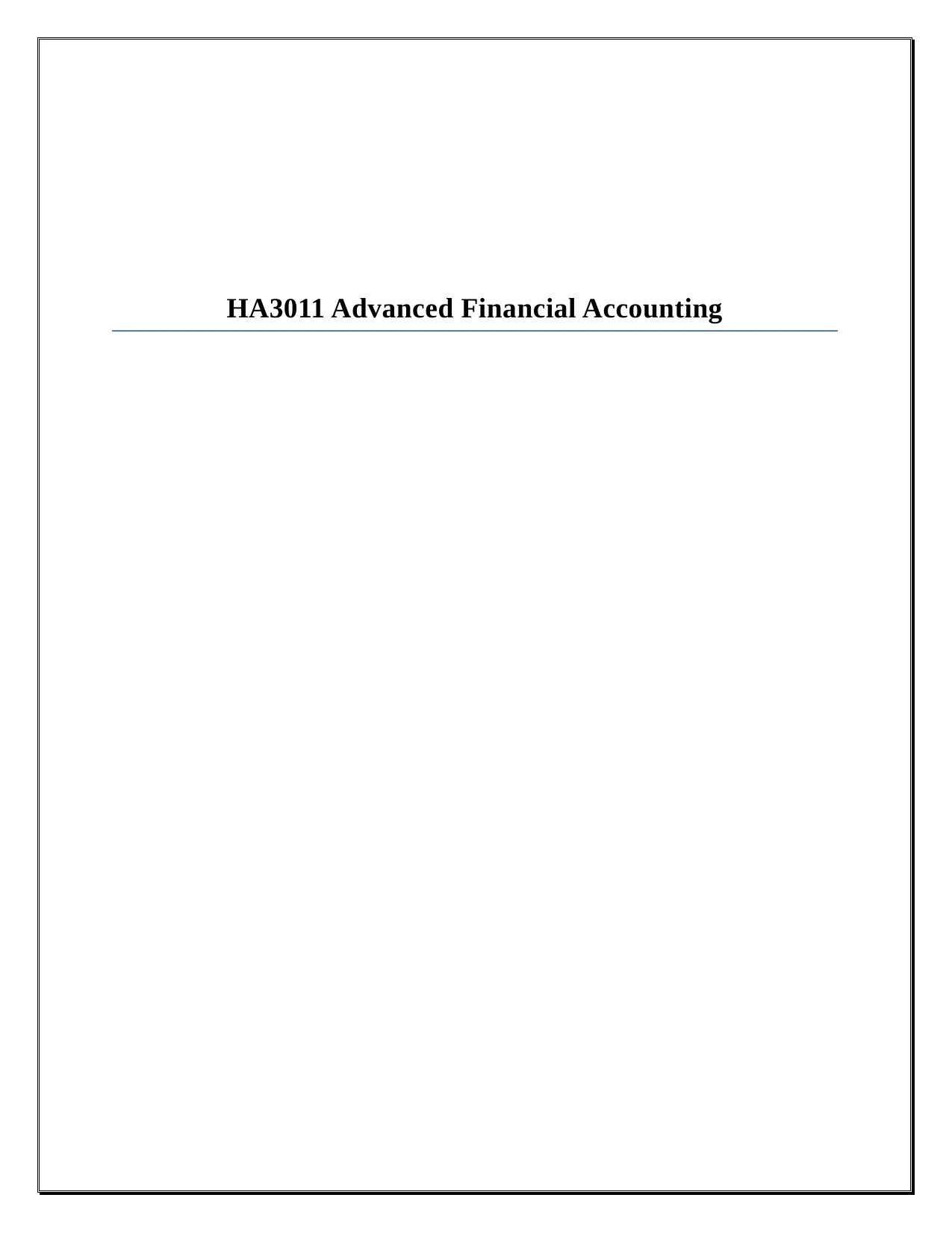
HA3011 Advanced Financial Accounting
Secure Best Marks with AI Grader
Need help grading? Try our AI Grader for instant feedback on your assignments.

Contents
Assessment task part A:..............................................................................................................................2
Assessment task part B:...............................................................................................................................6
Assessment task part C:...............................................................................................................................8
Assessment task part D:..............................................................................................................................9
References:................................................................................................................................................10
Assessment task part A:..............................................................................................................................2
Assessment task part B:...............................................................................................................................6
Assessment task part C:...............................................................................................................................8
Assessment task part D:..............................................................................................................................9
References:................................................................................................................................................10
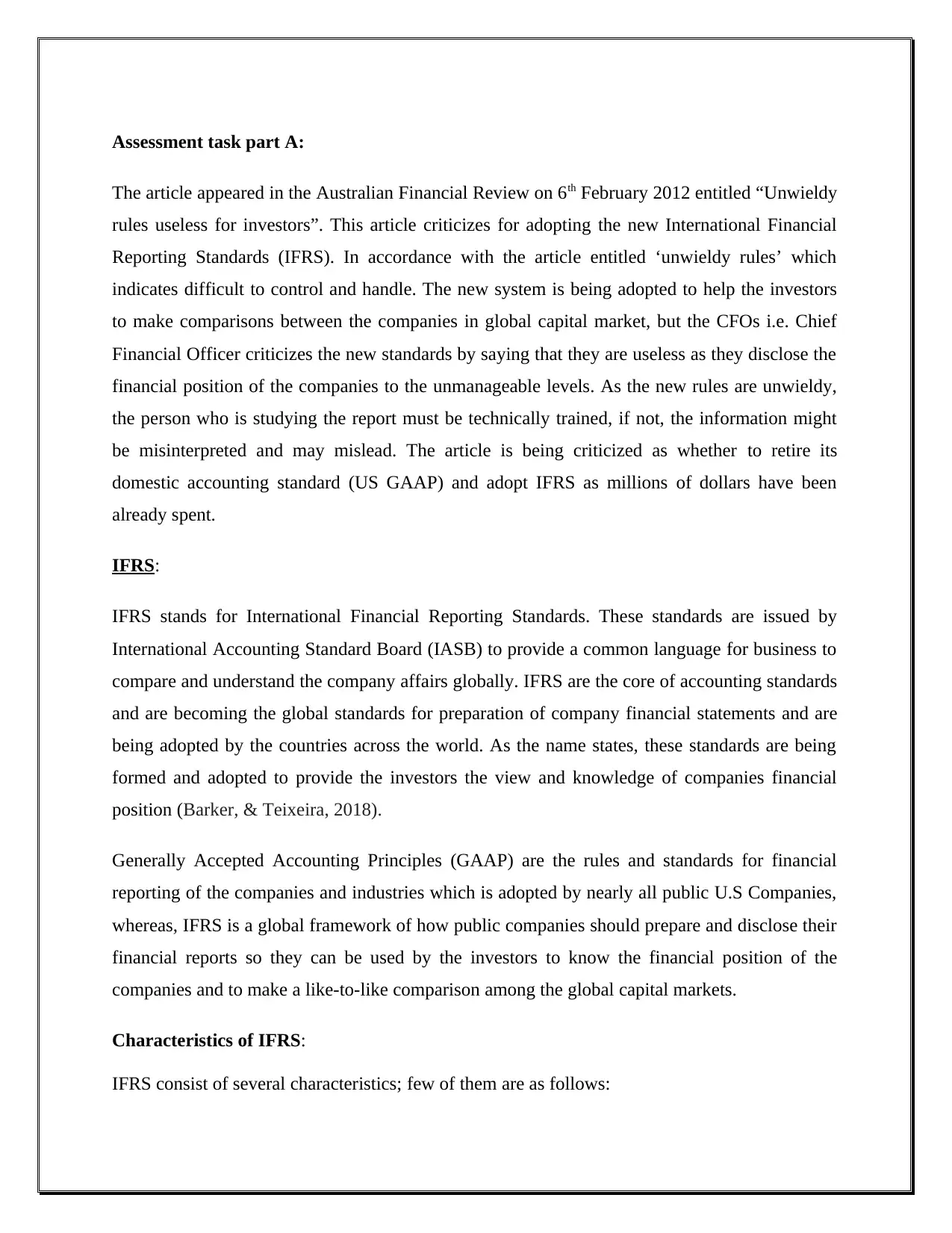
Assessment task part A:
The article appeared in the Australian Financial Review on 6th February 2012 entitled “Unwieldy
rules useless for investors”. This article criticizes for adopting the new International Financial
Reporting Standards (IFRS). In accordance with the article entitled ‘unwieldy rules’ which
indicates difficult to control and handle. The new system is being adopted to help the investors
to make comparisons between the companies in global capital market, but the CFOs i.e. Chief
Financial Officer criticizes the new standards by saying that they are useless as they disclose the
financial position of the companies to the unmanageable levels. As the new rules are unwieldy,
the person who is studying the report must be technically trained, if not, the information might
be misinterpreted and may mislead. The article is being criticized as whether to retire its
domestic accounting standard (US GAAP) and adopt IFRS as millions of dollars have been
already spent.
IFRS:
IFRS stands for International Financial Reporting Standards. These standards are issued by
International Accounting Standard Board (IASB) to provide a common language for business to
compare and understand the company affairs globally. IFRS are the core of accounting standards
and are becoming the global standards for preparation of company financial statements and are
being adopted by the countries across the world. As the name states, these standards are being
formed and adopted to provide the investors the view and knowledge of companies financial
position (Barker, & Teixeira, 2018).
Generally Accepted Accounting Principles (GAAP) are the rules and standards for financial
reporting of the companies and industries which is adopted by nearly all public U.S Companies,
whereas, IFRS is a global framework of how public companies should prepare and disclose their
financial reports so they can be used by the investors to know the financial position of the
companies and to make a like-to-like comparison among the global capital markets.
Characteristics of IFRS:
IFRS consist of several characteristics; few of them are as follows:
The article appeared in the Australian Financial Review on 6th February 2012 entitled “Unwieldy
rules useless for investors”. This article criticizes for adopting the new International Financial
Reporting Standards (IFRS). In accordance with the article entitled ‘unwieldy rules’ which
indicates difficult to control and handle. The new system is being adopted to help the investors
to make comparisons between the companies in global capital market, but the CFOs i.e. Chief
Financial Officer criticizes the new standards by saying that they are useless as they disclose the
financial position of the companies to the unmanageable levels. As the new rules are unwieldy,
the person who is studying the report must be technically trained, if not, the information might
be misinterpreted and may mislead. The article is being criticized as whether to retire its
domestic accounting standard (US GAAP) and adopt IFRS as millions of dollars have been
already spent.
IFRS:
IFRS stands for International Financial Reporting Standards. These standards are issued by
International Accounting Standard Board (IASB) to provide a common language for business to
compare and understand the company affairs globally. IFRS are the core of accounting standards
and are becoming the global standards for preparation of company financial statements and are
being adopted by the countries across the world. As the name states, these standards are being
formed and adopted to provide the investors the view and knowledge of companies financial
position (Barker, & Teixeira, 2018).
Generally Accepted Accounting Principles (GAAP) are the rules and standards for financial
reporting of the companies and industries which is adopted by nearly all public U.S Companies,
whereas, IFRS is a global framework of how public companies should prepare and disclose their
financial reports so they can be used by the investors to know the financial position of the
companies and to make a like-to-like comparison among the global capital markets.
Characteristics of IFRS:
IFRS consist of several characteristics; few of them are as follows:
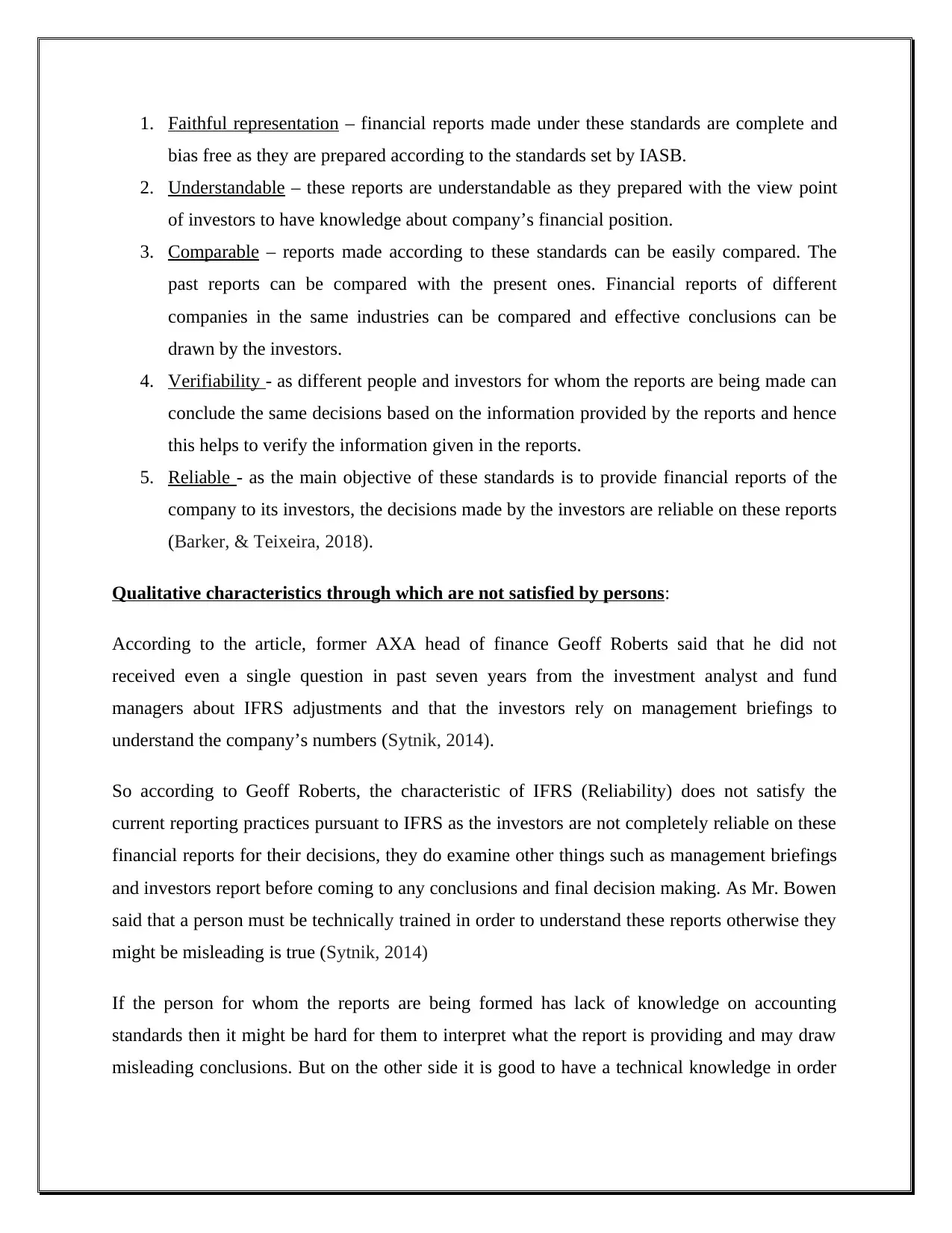
1. Faithful representation – financial reports made under these standards are complete and
bias free as they are prepared according to the standards set by IASB.
2. Understandable – these reports are understandable as they prepared with the view point
of investors to have knowledge about company’s financial position.
3. Comparable – reports made according to these standards can be easily compared. The
past reports can be compared with the present ones. Financial reports of different
companies in the same industries can be compared and effective conclusions can be
drawn by the investors.
4. Verifiability - as different people and investors for whom the reports are being made can
conclude the same decisions based on the information provided by the reports and hence
this helps to verify the information given in the reports.
5. Reliable - as the main objective of these standards is to provide financial reports of the
company to its investors, the decisions made by the investors are reliable on these reports
(Barker, & Teixeira, 2018).
Qualitative characteristics through which are not satisfied by persons:
According to the article, former AXA head of finance Geoff Roberts said that he did not
received even a single question in past seven years from the investment analyst and fund
managers about IFRS adjustments and that the investors rely on management briefings to
understand the company’s numbers (Sytnik, 2014).
So according to Geoff Roberts, the characteristic of IFRS (Reliability) does not satisfy the
current reporting practices pursuant to IFRS as the investors are not completely reliable on these
financial reports for their decisions, they do examine other things such as management briefings
and investors report before coming to any conclusions and final decision making. As Mr. Bowen
said that a person must be technically trained in order to understand these reports otherwise they
might be misleading is true (Sytnik, 2014)
If the person for whom the reports are being formed has lack of knowledge on accounting
standards then it might be hard for them to interpret what the report is providing and may draw
misleading conclusions. But on the other side it is good to have a technical knowledge in order
bias free as they are prepared according to the standards set by IASB.
2. Understandable – these reports are understandable as they prepared with the view point
of investors to have knowledge about company’s financial position.
3. Comparable – reports made according to these standards can be easily compared. The
past reports can be compared with the present ones. Financial reports of different
companies in the same industries can be compared and effective conclusions can be
drawn by the investors.
4. Verifiability - as different people and investors for whom the reports are being made can
conclude the same decisions based on the information provided by the reports and hence
this helps to verify the information given in the reports.
5. Reliable - as the main objective of these standards is to provide financial reports of the
company to its investors, the decisions made by the investors are reliable on these reports
(Barker, & Teixeira, 2018).
Qualitative characteristics through which are not satisfied by persons:
According to the article, former AXA head of finance Geoff Roberts said that he did not
received even a single question in past seven years from the investment analyst and fund
managers about IFRS adjustments and that the investors rely on management briefings to
understand the company’s numbers (Sytnik, 2014).
So according to Geoff Roberts, the characteristic of IFRS (Reliability) does not satisfy the
current reporting practices pursuant to IFRS as the investors are not completely reliable on these
financial reports for their decisions, they do examine other things such as management briefings
and investors report before coming to any conclusions and final decision making. As Mr. Bowen
said that a person must be technically trained in order to understand these reports otherwise they
might be misleading is true (Sytnik, 2014)
If the person for whom the reports are being formed has lack of knowledge on accounting
standards then it might be hard for them to interpret what the report is providing and may draw
misleading conclusions. But on the other side it is good to have a technical knowledge in order
Secure Best Marks with AI Grader
Need help grading? Try our AI Grader for instant feedback on your assignments.
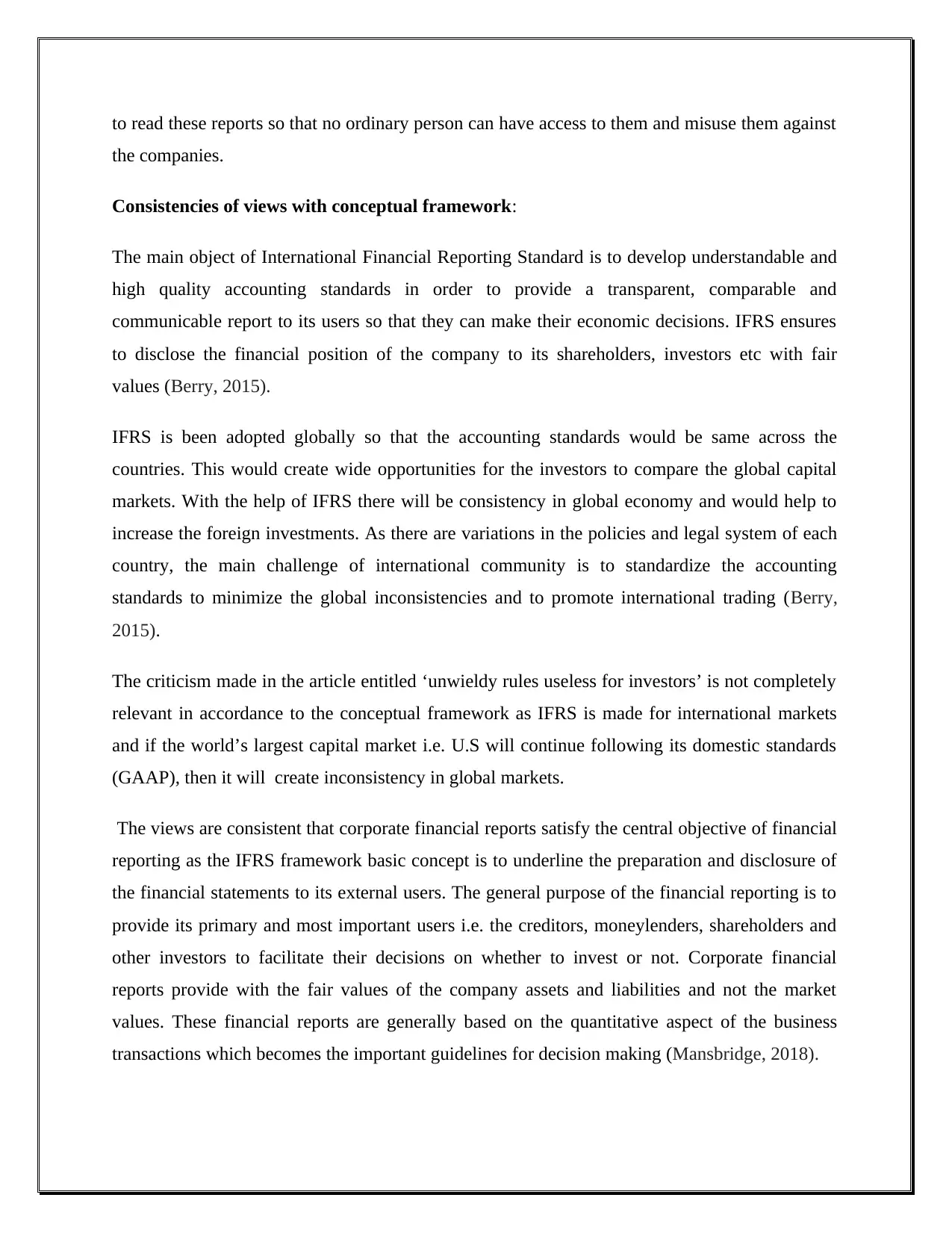
to read these reports so that no ordinary person can have access to them and misuse them against
the companies.
Consistencies of views with conceptual framework:
The main object of International Financial Reporting Standard is to develop understandable and
high quality accounting standards in order to provide a transparent, comparable and
communicable report to its users so that they can make their economic decisions. IFRS ensures
to disclose the financial position of the company to its shareholders, investors etc with fair
values (Berry, 2015).
IFRS is been adopted globally so that the accounting standards would be same across the
countries. This would create wide opportunities for the investors to compare the global capital
markets. With the help of IFRS there will be consistency in global economy and would help to
increase the foreign investments. As there are variations in the policies and legal system of each
country, the main challenge of international community is to standardize the accounting
standards to minimize the global inconsistencies and to promote international trading (Berry,
2015).
The criticism made in the article entitled ‘unwieldy rules useless for investors’ is not completely
relevant in accordance to the conceptual framework as IFRS is made for international markets
and if the world’s largest capital market i.e. U.S will continue following its domestic standards
(GAAP), then it will create inconsistency in global markets.
The views are consistent that corporate financial reports satisfy the central objective of financial
reporting as the IFRS framework basic concept is to underline the preparation and disclosure of
the financial statements to its external users. The general purpose of the financial reporting is to
provide its primary and most important users i.e. the creditors, moneylenders, shareholders and
other investors to facilitate their decisions on whether to invest or not. Corporate financial
reports provide with the fair values of the company assets and liabilities and not the market
values. These financial reports are generally based on the quantitative aspect of the business
transactions which becomes the important guidelines for decision making (Mansbridge, 2018).
the companies.
Consistencies of views with conceptual framework:
The main object of International Financial Reporting Standard is to develop understandable and
high quality accounting standards in order to provide a transparent, comparable and
communicable report to its users so that they can make their economic decisions. IFRS ensures
to disclose the financial position of the company to its shareholders, investors etc with fair
values (Berry, 2015).
IFRS is been adopted globally so that the accounting standards would be same across the
countries. This would create wide opportunities for the investors to compare the global capital
markets. With the help of IFRS there will be consistency in global economy and would help to
increase the foreign investments. As there are variations in the policies and legal system of each
country, the main challenge of international community is to standardize the accounting
standards to minimize the global inconsistencies and to promote international trading (Berry,
2015).
The criticism made in the article entitled ‘unwieldy rules useless for investors’ is not completely
relevant in accordance to the conceptual framework as IFRS is made for international markets
and if the world’s largest capital market i.e. U.S will continue following its domestic standards
(GAAP), then it will create inconsistency in global markets.
The views are consistent that corporate financial reports satisfy the central objective of financial
reporting as the IFRS framework basic concept is to underline the preparation and disclosure of
the financial statements to its external users. The general purpose of the financial reporting is to
provide its primary and most important users i.e. the creditors, moneylenders, shareholders and
other investors to facilitate their decisions on whether to invest or not. Corporate financial
reports provide with the fair values of the company assets and liabilities and not the market
values. These financial reports are generally based on the quantitative aspect of the business
transactions which becomes the important guidelines for decision making (Mansbridge, 2018).
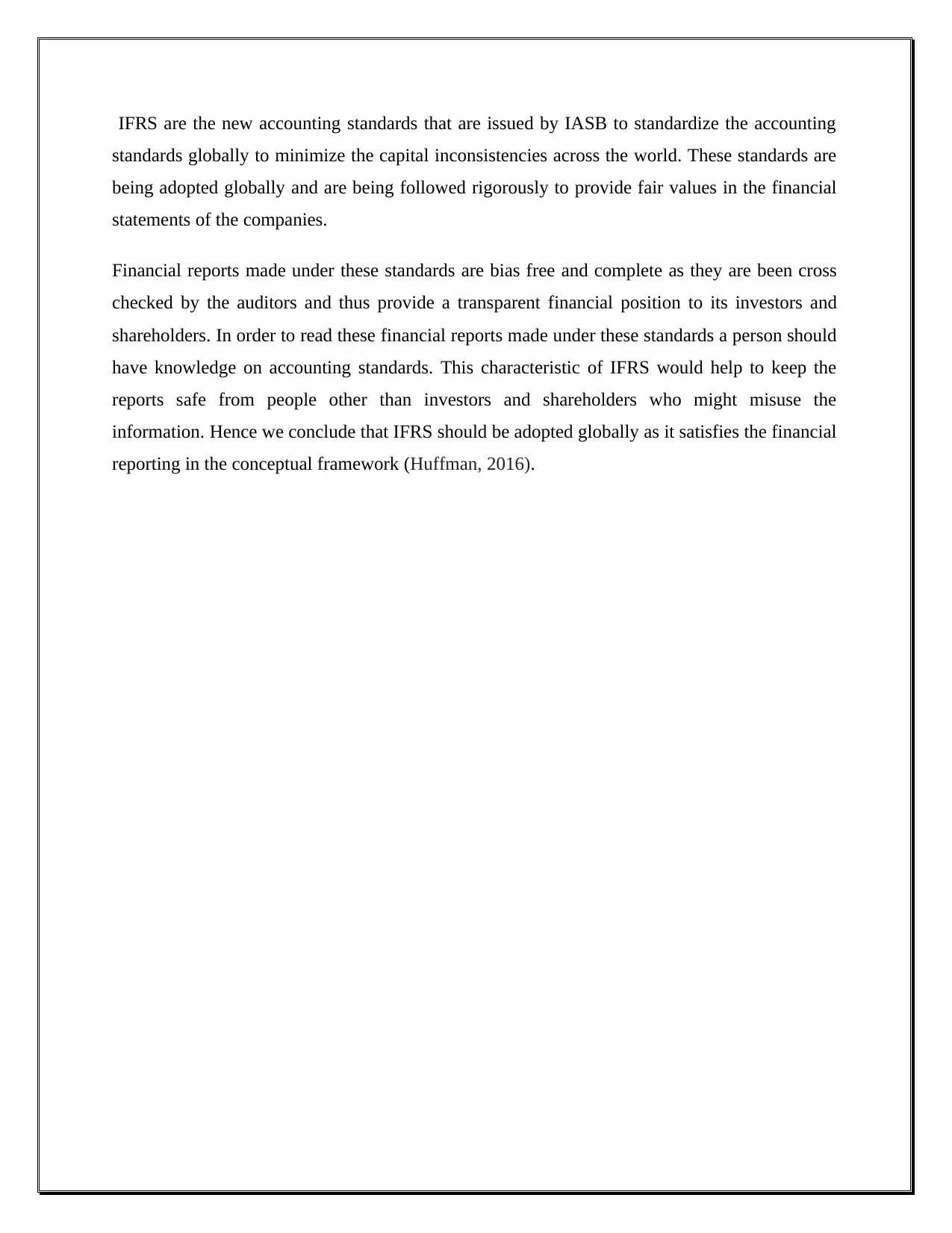
IFRS are the new accounting standards that are issued by IASB to standardize the accounting
standards globally to minimize the capital inconsistencies across the world. These standards are
being adopted globally and are being followed rigorously to provide fair values in the financial
statements of the companies.
Financial reports made under these standards are bias free and complete as they are been cross
checked by the auditors and thus provide a transparent financial position to its investors and
shareholders. In order to read these financial reports made under these standards a person should
have knowledge on accounting standards. This characteristic of IFRS would help to keep the
reports safe from people other than investors and shareholders who might misuse the
information. Hence we conclude that IFRS should be adopted globally as it satisfies the financial
reporting in the conceptual framework (Huffman, 2016).
standards globally to minimize the capital inconsistencies across the world. These standards are
being adopted globally and are being followed rigorously to provide fair values in the financial
statements of the companies.
Financial reports made under these standards are bias free and complete as they are been cross
checked by the auditors and thus provide a transparent financial position to its investors and
shareholders. In order to read these financial reports made under these standards a person should
have knowledge on accounting standards. This characteristic of IFRS would help to keep the
reports safe from people other than investors and shareholders who might misuse the
information. Hence we conclude that IFRS should be adopted globally as it satisfies the financial
reporting in the conceptual framework (Huffman, 2016).
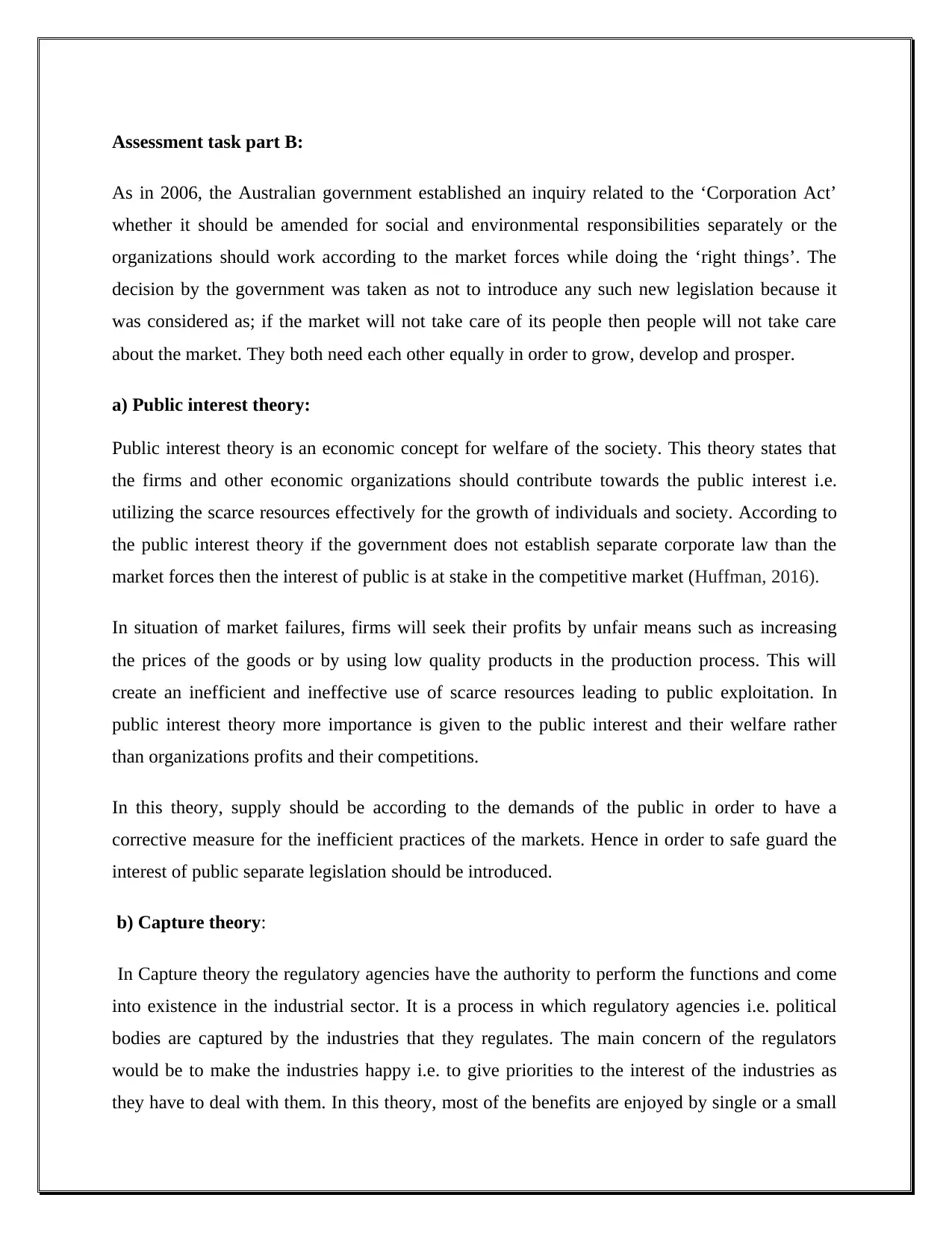
Assessment task part B:
As in 2006, the Australian government established an inquiry related to the ‘Corporation Act’
whether it should be amended for social and environmental responsibilities separately or the
organizations should work according to the market forces while doing the ‘right things’. The
decision by the government was taken as not to introduce any such new legislation because it
was considered as; if the market will not take care of its people then people will not take care
about the market. They both need each other equally in order to grow, develop and prosper.
a) Public interest theory:
Public interest theory is an economic concept for welfare of the society. This theory states that
the firms and other economic organizations should contribute towards the public interest i.e.
utilizing the scarce resources effectively for the growth of individuals and society. According to
the public interest theory if the government does not establish separate corporate law than the
market forces then the interest of public is at stake in the competitive market (Huffman, 2016).
In situation of market failures, firms will seek their profits by unfair means such as increasing
the prices of the goods or by using low quality products in the production process. This will
create an inefficient and ineffective use of scarce resources leading to public exploitation. In
public interest theory more importance is given to the public interest and their welfare rather
than organizations profits and their competitions.
In this theory, supply should be according to the demands of the public in order to have a
corrective measure for the inefficient practices of the markets. Hence in order to safe guard the
interest of public separate legislation should be introduced.
b) Capture theory:
In Capture theory the regulatory agencies have the authority to perform the functions and come
into existence in the industrial sector. It is a process in which regulatory agencies i.e. political
bodies are captured by the industries that they regulates. The main concern of the regulators
would be to make the industries happy i.e. to give priorities to the interest of the industries as
they have to deal with them. In this theory, most of the benefits are enjoyed by single or a small
As in 2006, the Australian government established an inquiry related to the ‘Corporation Act’
whether it should be amended for social and environmental responsibilities separately or the
organizations should work according to the market forces while doing the ‘right things’. The
decision by the government was taken as not to introduce any such new legislation because it
was considered as; if the market will not take care of its people then people will not take care
about the market. They both need each other equally in order to grow, develop and prosper.
a) Public interest theory:
Public interest theory is an economic concept for welfare of the society. This theory states that
the firms and other economic organizations should contribute towards the public interest i.e.
utilizing the scarce resources effectively for the growth of individuals and society. According to
the public interest theory if the government does not establish separate corporate law than the
market forces then the interest of public is at stake in the competitive market (Huffman, 2016).
In situation of market failures, firms will seek their profits by unfair means such as increasing
the prices of the goods or by using low quality products in the production process. This will
create an inefficient and ineffective use of scarce resources leading to public exploitation. In
public interest theory more importance is given to the public interest and their welfare rather
than organizations profits and their competitions.
In this theory, supply should be according to the demands of the public in order to have a
corrective measure for the inefficient practices of the markets. Hence in order to safe guard the
interest of public separate legislation should be introduced.
b) Capture theory:
In Capture theory the regulatory agencies have the authority to perform the functions and come
into existence in the industrial sector. It is a process in which regulatory agencies i.e. political
bodies are captured by the industries that they regulates. The main concern of the regulators
would be to make the industries happy i.e. to give priorities to the interest of the industries as
they have to deal with them. In this theory, most of the benefits are enjoyed by single or a small
Paraphrase This Document
Need a fresh take? Get an instant paraphrase of this document with our AI Paraphraser
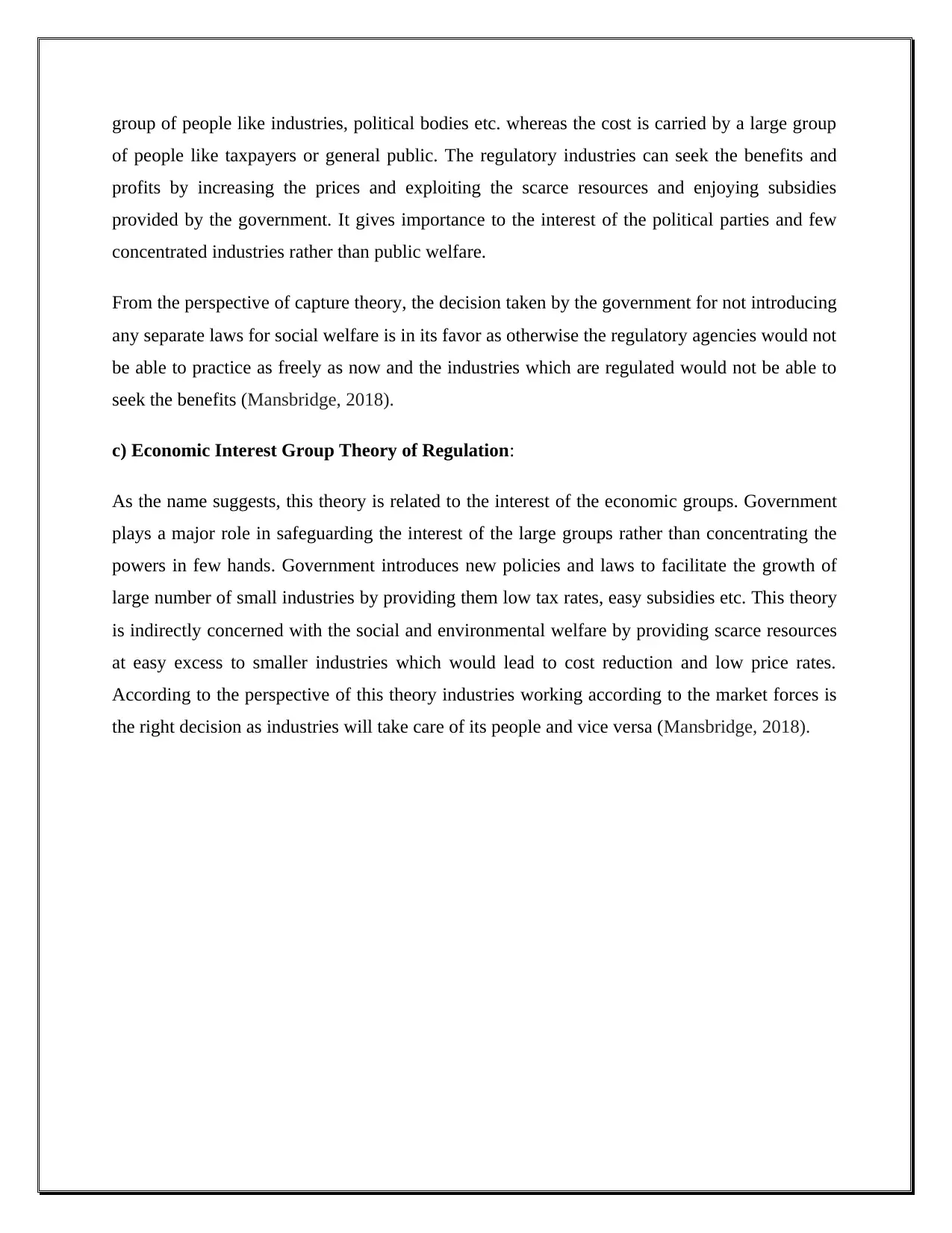
group of people like industries, political bodies etc. whereas the cost is carried by a large group
of people like taxpayers or general public. The regulatory industries can seek the benefits and
profits by increasing the prices and exploiting the scarce resources and enjoying subsidies
provided by the government. It gives importance to the interest of the political parties and few
concentrated industries rather than public welfare.
From the perspective of capture theory, the decision taken by the government for not introducing
any separate laws for social welfare is in its favor as otherwise the regulatory agencies would not
be able to practice as freely as now and the industries which are regulated would not be able to
seek the benefits (Mansbridge, 2018).
c) Economic Interest Group Theory of Regulation:
As the name suggests, this theory is related to the interest of the economic groups. Government
plays a major role in safeguarding the interest of the large groups rather than concentrating the
powers in few hands. Government introduces new policies and laws to facilitate the growth of
large number of small industries by providing them low tax rates, easy subsidies etc. This theory
is indirectly concerned with the social and environmental welfare by providing scarce resources
at easy excess to smaller industries which would lead to cost reduction and low price rates.
According to the perspective of this theory industries working according to the market forces is
the right decision as industries will take care of its people and vice versa (Mansbridge, 2018).
of people like taxpayers or general public. The regulatory industries can seek the benefits and
profits by increasing the prices and exploiting the scarce resources and enjoying subsidies
provided by the government. It gives importance to the interest of the political parties and few
concentrated industries rather than public welfare.
From the perspective of capture theory, the decision taken by the government for not introducing
any separate laws for social welfare is in its favor as otherwise the regulatory agencies would not
be able to practice as freely as now and the industries which are regulated would not be able to
seek the benefits (Mansbridge, 2018).
c) Economic Interest Group Theory of Regulation:
As the name suggests, this theory is related to the interest of the economic groups. Government
plays a major role in safeguarding the interest of the large groups rather than concentrating the
powers in few hands. Government introduces new policies and laws to facilitate the growth of
large number of small industries by providing them low tax rates, easy subsidies etc. This theory
is indirectly concerned with the social and environmental welfare by providing scarce resources
at easy excess to smaller industries which would lead to cost reduction and low price rates.
According to the perspective of this theory industries working according to the market forces is
the right decision as industries will take care of its people and vice versa (Mansbridge, 2018).
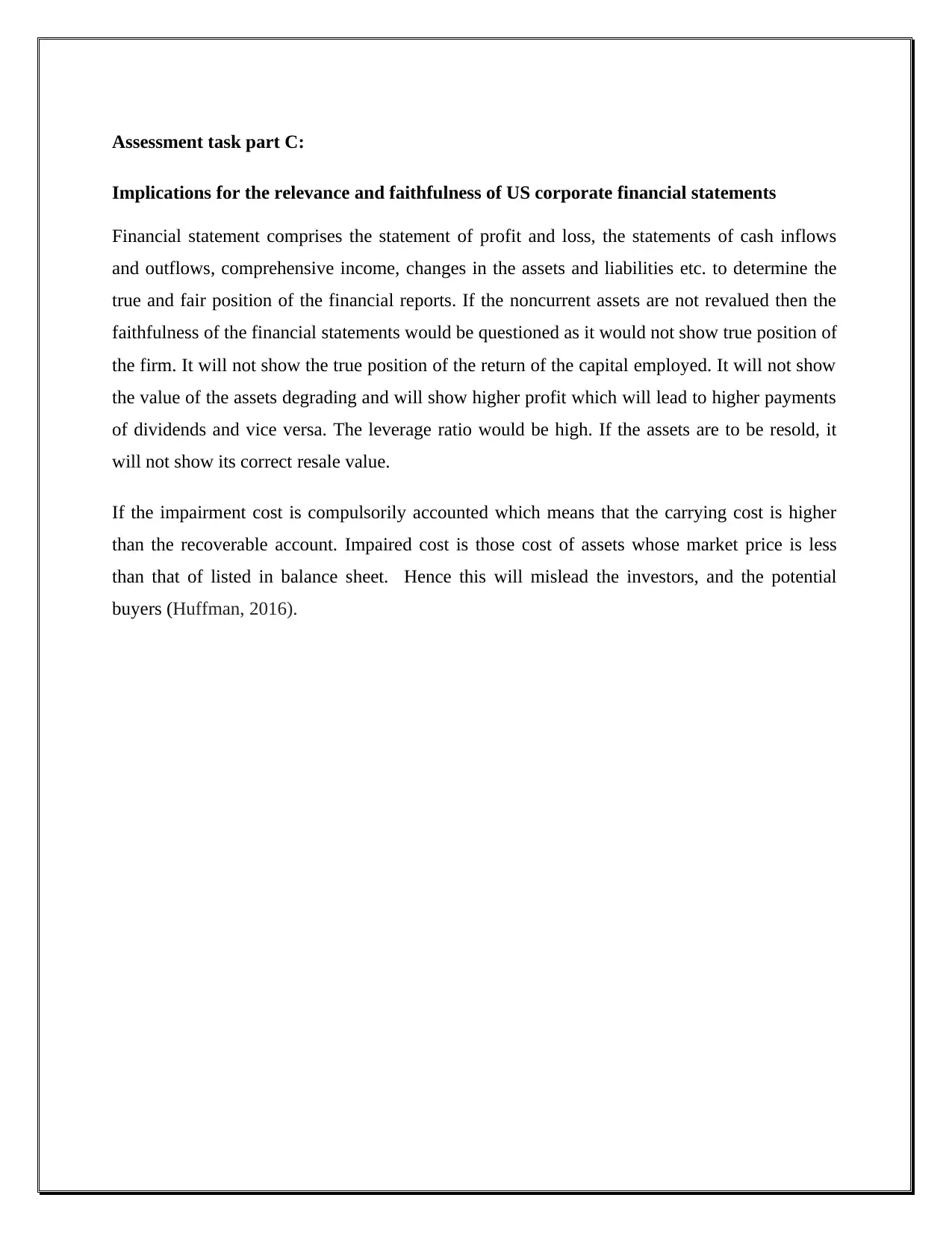
Assessment task part C:
Implications for the relevance and faithfulness of US corporate financial statements
Financial statement comprises the statement of profit and loss, the statements of cash inflows
and outflows, comprehensive income, changes in the assets and liabilities etc. to determine the
true and fair position of the financial reports. If the noncurrent assets are not revalued then the
faithfulness of the financial statements would be questioned as it would not show true position of
the firm. It will not show the true position of the return of the capital employed. It will not show
the value of the assets degrading and will show higher profit which will lead to higher payments
of dividends and vice versa. The leverage ratio would be high. If the assets are to be resold, it
will not show its correct resale value.
If the impairment cost is compulsorily accounted which means that the carrying cost is higher
than the recoverable account. Impaired cost is those cost of assets whose market price is less
than that of listed in balance sheet. Hence this will mislead the investors, and the potential
buyers (Huffman, 2016).
Implications for the relevance and faithfulness of US corporate financial statements
Financial statement comprises the statement of profit and loss, the statements of cash inflows
and outflows, comprehensive income, changes in the assets and liabilities etc. to determine the
true and fair position of the financial reports. If the noncurrent assets are not revalued then the
faithfulness of the financial statements would be questioned as it would not show true position of
the firm. It will not show the true position of the return of the capital employed. It will not show
the value of the assets degrading and will show higher profit which will lead to higher payments
of dividends and vice versa. The leverage ratio would be high. If the assets are to be resold, it
will not show its correct resale value.
If the impairment cost is compulsorily accounted which means that the carrying cost is higher
than the recoverable account. Impaired cost is those cost of assets whose market price is less
than that of listed in balance sheet. Hence this will mislead the investors, and the potential
buyers (Huffman, 2016).
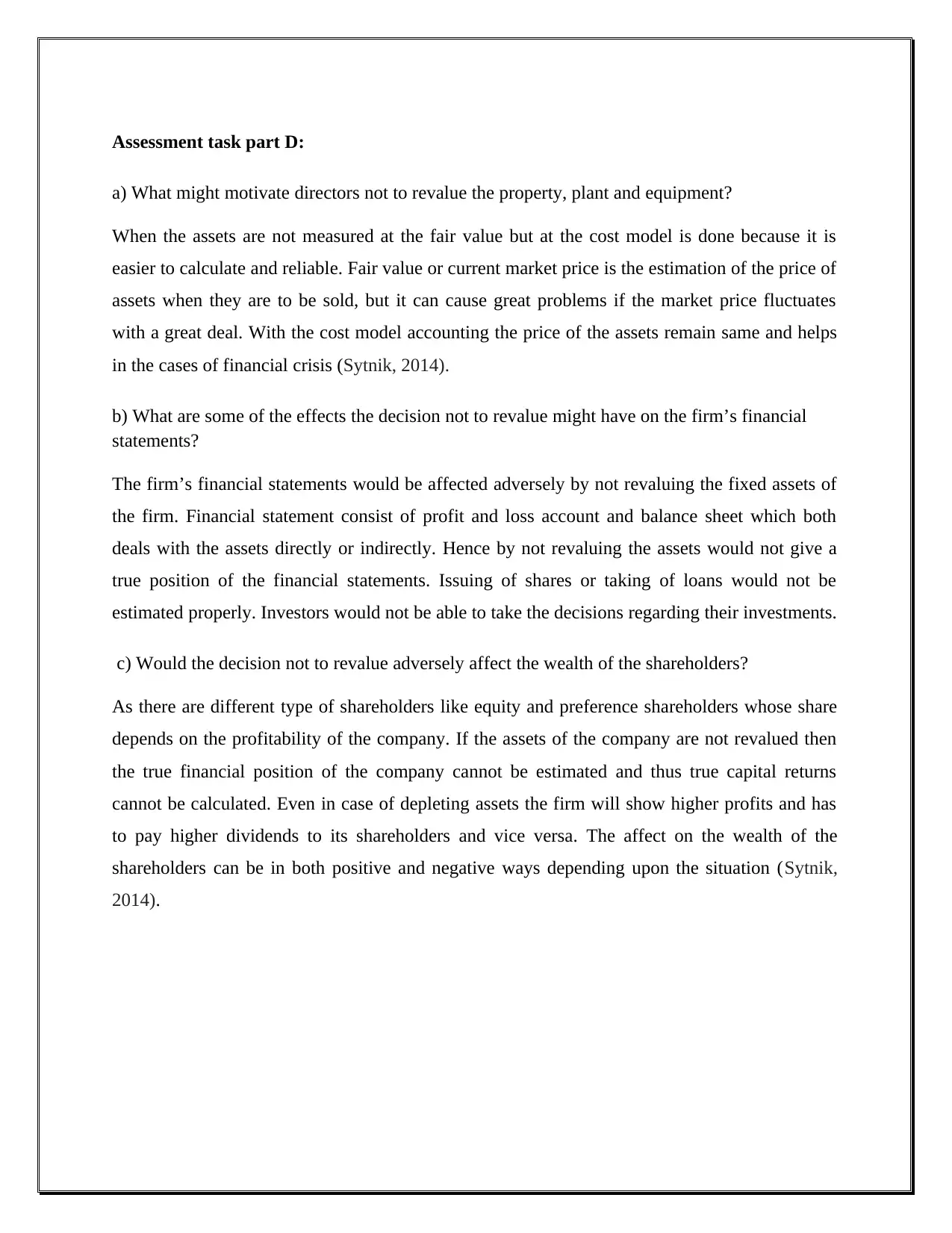
Assessment task part D:
a) What might motivate directors not to revalue the property, plant and equipment?
When the assets are not measured at the fair value but at the cost model is done because it is
easier to calculate and reliable. Fair value or current market price is the estimation of the price of
assets when they are to be sold, but it can cause great problems if the market price fluctuates
with a great deal. With the cost model accounting the price of the assets remain same and helps
in the cases of financial crisis (Sytnik, 2014).
b) What are some of the effects the decision not to revalue might have on the firm’s financial
statements?
The firm’s financial statements would be affected adversely by not revaluing the fixed assets of
the firm. Financial statement consist of profit and loss account and balance sheet which both
deals with the assets directly or indirectly. Hence by not revaluing the assets would not give a
true position of the financial statements. Issuing of shares or taking of loans would not be
estimated properly. Investors would not be able to take the decisions regarding their investments.
c) Would the decision not to revalue adversely affect the wealth of the shareholders?
As there are different type of shareholders like equity and preference shareholders whose share
depends on the profitability of the company. If the assets of the company are not revalued then
the true financial position of the company cannot be estimated and thus true capital returns
cannot be calculated. Even in case of depleting assets the firm will show higher profits and has
to pay higher dividends to its shareholders and vice versa. The affect on the wealth of the
shareholders can be in both positive and negative ways depending upon the situation (Sytnik,
2014).
a) What might motivate directors not to revalue the property, plant and equipment?
When the assets are not measured at the fair value but at the cost model is done because it is
easier to calculate and reliable. Fair value or current market price is the estimation of the price of
assets when they are to be sold, but it can cause great problems if the market price fluctuates
with a great deal. With the cost model accounting the price of the assets remain same and helps
in the cases of financial crisis (Sytnik, 2014).
b) What are some of the effects the decision not to revalue might have on the firm’s financial
statements?
The firm’s financial statements would be affected adversely by not revaluing the fixed assets of
the firm. Financial statement consist of profit and loss account and balance sheet which both
deals with the assets directly or indirectly. Hence by not revaluing the assets would not give a
true position of the financial statements. Issuing of shares or taking of loans would not be
estimated properly. Investors would not be able to take the decisions regarding their investments.
c) Would the decision not to revalue adversely affect the wealth of the shareholders?
As there are different type of shareholders like equity and preference shareholders whose share
depends on the profitability of the company. If the assets of the company are not revalued then
the true financial position of the company cannot be estimated and thus true capital returns
cannot be calculated. Even in case of depleting assets the firm will show higher profits and has
to pay higher dividends to its shareholders and vice versa. The affect on the wealth of the
shareholders can be in both positive and negative ways depending upon the situation (Sytnik,
2014).
Secure Best Marks with AI Grader
Need help grading? Try our AI Grader for instant feedback on your assignments.
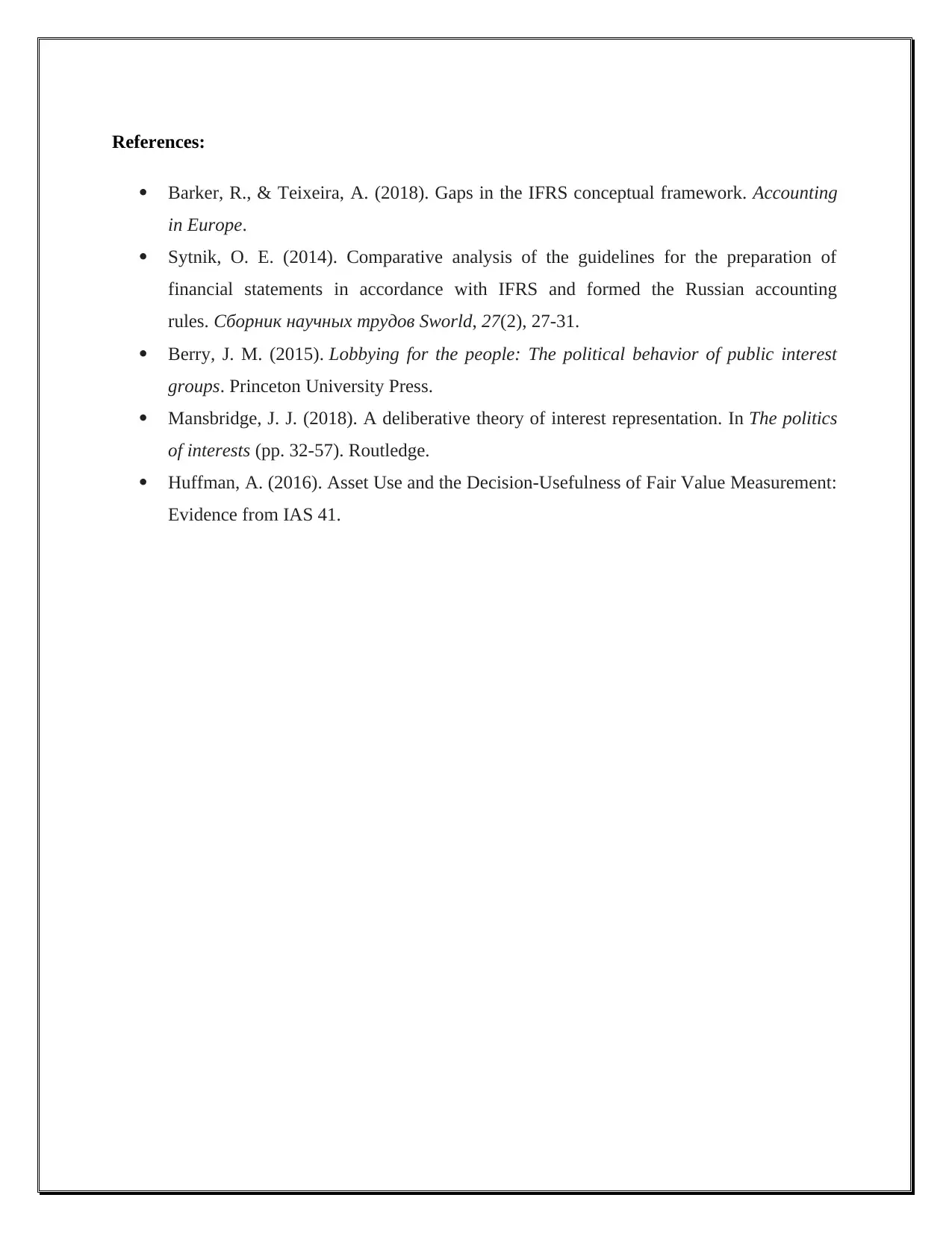
References:
Barker, R., & Teixeira, A. (2018). Gaps in the IFRS conceptual framework. Accounting
in Europe.
Sytnik, O. E. (2014). Comparative analysis of the guidelines for the preparation of
financial statements in accordance with IFRS and formed the Russian accounting
rules. Сборник научных трудов Sworld, 27(2), 27-31.
Berry, J. M. (2015). Lobbying for the people: The political behavior of public interest
groups. Princeton University Press.
Mansbridge, J. J. (2018). A deliberative theory of interest representation. In The politics
of interests (pp. 32-57). Routledge.
Huffman, A. (2016). Asset Use and the Decision-Usefulness of Fair Value Measurement:
Evidence from IAS 41.
Barker, R., & Teixeira, A. (2018). Gaps in the IFRS conceptual framework. Accounting
in Europe.
Sytnik, O. E. (2014). Comparative analysis of the guidelines for the preparation of
financial statements in accordance with IFRS and formed the Russian accounting
rules. Сборник научных трудов Sworld, 27(2), 27-31.
Berry, J. M. (2015). Lobbying for the people: The political behavior of public interest
groups. Princeton University Press.
Mansbridge, J. J. (2018). A deliberative theory of interest representation. In The politics
of interests (pp. 32-57). Routledge.
Huffman, A. (2016). Asset Use and the Decision-Usefulness of Fair Value Measurement:
Evidence from IAS 41.

1 out of 12
Related Documents
Your All-in-One AI-Powered Toolkit for Academic Success.
+13062052269
info@desklib.com
Available 24*7 on WhatsApp / Email
![[object Object]](/_next/static/media/star-bottom.7253800d.svg)
Unlock your academic potential
© 2024 | Zucol Services PVT LTD | All rights reserved.




